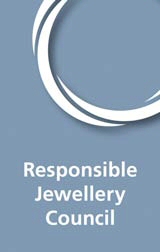Responsible Jewellery Council Publishes First Impacts Report
June 30, 14
 |
As a full member of the ISEAL Alliance [a global association for sustainability standards], RJC commits to follow the ISEAL Impacts Code and report annually on its Monitoring and Evaluation program. This process provides RJC with valuable feedback on the effectiveness of its strategies and programs, prompting improvements, the RJC said.
An impacts report aims to answer the important question of ‘what difference does this program make?’, and is part of ISEAL Impacts Code compliance.
As the first report on RJC’s Certification programs, the report sets out a baseline for future evaluations. Drawing on audit data, collaboration reports and independent studies, the RJC Impacts Report provides a snapshot of RJC’s mine to retail activities in the jewelry supply chain. It examines progress to date and also reviews the challenges still ahead. Overall, the report shows that RJC appears to be an effective catalyst for change, helping companies meet compliance needs and build a better business. Key findings include:
• Uptake of RJC Certification continues to grow year on year, and in relevant sectors. Around the world, there are now more than 270,000 employees working at more than 5,900 Facilities covered by RJC Certification.
• While the mining sector still has low uptake within RJC, two case studies show that RJC standards are having a positive impact in setting new benchmarks for good practice.
• Uptake of RJC Certification in India is positive, and further growth is anticipated. An independent evaluation finds that RJC’s standards can help the Indian industry manage key risks.
• Small-to-medium enterprises (SMEs) already represent more than half of RJC’s Membership. Certification can be successfully achieved by SMEs, but more can be done to raise awareness and support uptake.
• Working in partnership with key stakeholders is crucial to support implementation of, and demand for, responsible practices in jewelry supply chains. RJC’s standards harmonization efforts have contributed greatly to the increasing focus on gold supply chain due diligence.
“RJC’s first Impacts Report provides an opportunity to reflect on our direction over the last four years. The findings speak to RJC’s positive impacts to date, and the work that still lies ahead. We welcome feedback on the report content, particularly on what stakeholders would like to know more about in future. Each year RJC will publish an updated Impacts Report, enabling discussion about where we are doing well and where we could be doing better,” says Fiona Solomon, RJC’s director of Standards Development.